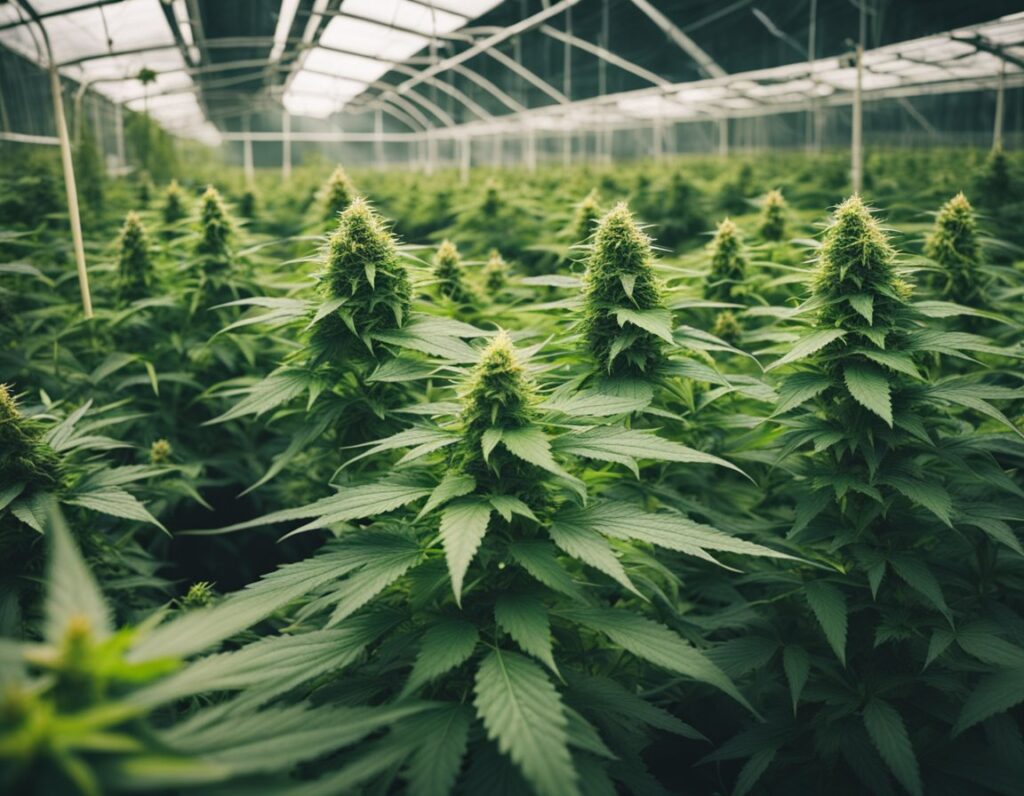
Organic cannabis cultivation thrives on sustainable practices that enhance the natural growth processes. In Vancouver, these methods not only improve the health of the plants but also align with the preferences of environmentally conscious consumers.
Organic cannabis refers to cannabis plants grown without the use of synthetic fertilizers, pesticides, or genetically modified organisms (GMOs). This cultivation method emphasizes the use of natural inputs, such as compost, cover crops, and beneficial insects, to maintain soil health and control pests.
In Vancouver, pursuing organic certification can help you market your cannabis effectively. Certified organic products often command higher prices in the cannabis industry, reflecting a growing consumer demand for high-quality, sustainably grown products.
Opting for organic cultivation provides several advantages for cannabis growers in Vancouver:
By adopting organic cultivation techniques, you can achieve high-quality cannabis while contributing positively to the industry and the environment.
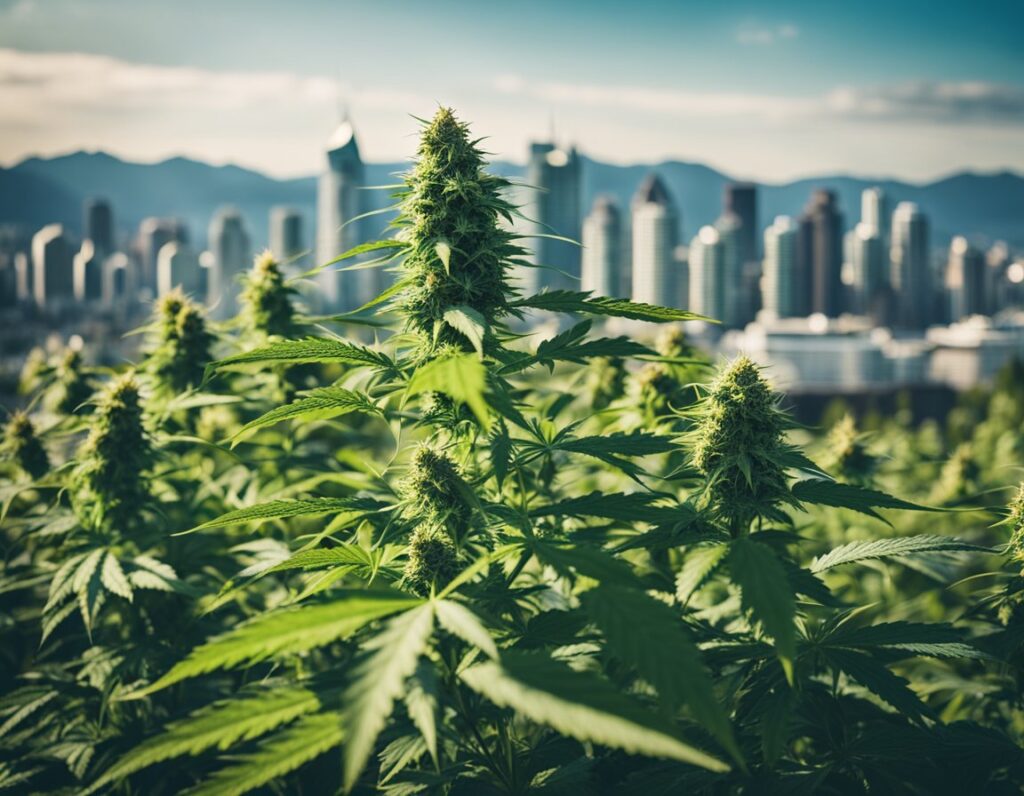
Maintaining soil health is crucial for successful organic cannabis cultivation. Healthy soil fosters a robust soil food web, providing essential nutrients and improving plant resilience. Utilizing organic amendments boosts soil fertility and enriches your growing medium, ensuring optimal conditions for your plants, especially when considering organic growing methods Vancouver.
Healthy soil supports the entire ecosystem of your cannabis garden. It enhances nutrient availability, water retention, and microbial activity. A balanced soil pH of 6.0-7.0 is ideal for nutrient uptake, while diverse microorganisms break down organic matter to release essential macronutrients and micronutrients.
These nutrients, including nitrogen, phosphorus, and potassium, are vital for plant growth. Additionally, healthy soil promotes the presence of trace minerals, which support various physiological functions in your cannabis plants. A thriving soil food web also enables natural pest control, reducing the need for synthetic pesticides.
Incorporate organic amendments to enhance soil fertility and structure. Compost is a top choice; it adds nutrients and improves soil aeration. Worm castings are rich in beneficial bacteria, supporting nutrient absorption and root health.
Consider using bone meal for phosphate, essential for strong root development. Kelp meal offers trace minerals and hormones that stimulate growth. A mix of these amendments can create a balanced nutrient profile.
When planning your amendment strategy, think about the specific needs of your plants. Regularly test soil health to monitor nutrient levels and adjust your amendment applications accordingly. This proactive approach ensures your cannabis crops thrive in a nutrient-rich and biologically active environment, especially when working with marijuana seeds Vancouver.
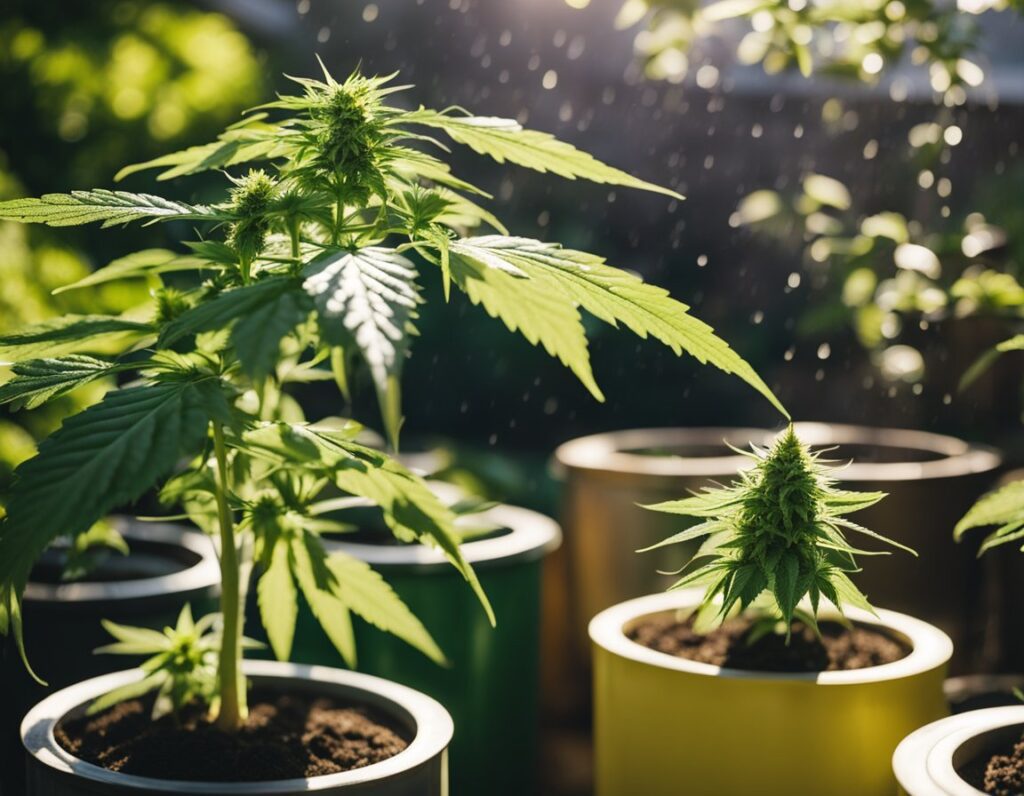
Effective nutrient management is essential for cultivating healthy cannabis plants. Implementing sustainable practices can enhance soil health, improve plant growth, and minimize environmental impact.
Composting transforms organic waste into nutrient-rich soil amendments. This process involves layering green materials, like vegetable scraps, with brown materials, such as dried leaves, in a compost bin. Regular turning aerates the pile, speeding decomposition.
Compost tea is a liquid extract from compost that serves as a powerful organic fertilizer. You create it by steeping finished compost in water, which extracts beneficial microorganisms and nutrients. When applied to your plants, this tea boosts microbial activity in the soil, enhancing nutrient availability and promoting robust growth.
Mulching involves spreading organic materials, like straw or wood chips, over the soil surface. This practice helps retain soil moisture, suppress weeds, and regulate temperature. As the mulch decomposes, it adds nutrients back into the soil, enriching it for your cannabis plants.
Top dressing is another valuable method. This involves adding a layer of organic amendments, such as worm castings or bat guano, directly on the soil surface. By top dressing every few weeks, you can continuously supply nutrients, supporting healthy plant development without the need for synthetic fertilizers.
A balanced nutrient cycle is vital for sustaining soil fertility. You can achieve this by utilizing various organic fertilizers, such as fish emulsion and kelp meal, which provide essential nutrients while enhancing soil structure.
Incorporating cover crops into your growing routine can also improve nutrient cycling. These plants, when tilled back into the soil, add organic matter and nutrients to the earth. Rotate your crops to prevent nutrient depletion and maintain soil vitality, ensuring your cannabis plants have access to the nutrients they need for optimal growth.
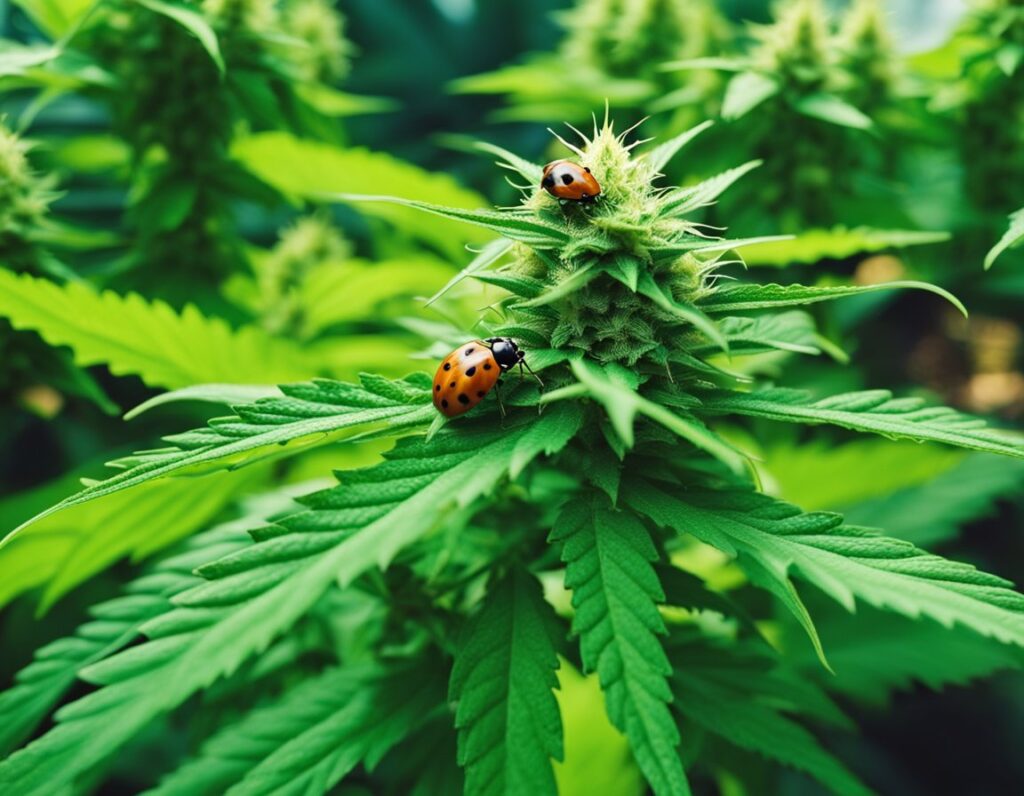
Effective management of pests and diseases is crucial for successful cannabis cultivation. Implementing organic methods not only protects your plants but also promotes a healthier ecosystem. Here are key strategies to consider.
Utilizing beneficial insects is an effective way to control pest populations. Ladybugs and lacewings are particularly effective against aphids and other harmful pests. You can attract these insects by planting flowers like marigolds and dill, which serve as natural habitats.
Companion planting is another method to enhance pest prevention. For example, planting basil near cannabis can deter whiteflies. Additionally, beneficial microbes can be introduced into the soil, supporting plant health and suppressing disease-causing organisms.
Regular inspections and maintaining plant health through proper watering and nutrients will further prevent infestations. A proactive approach creates a balanced environment where beneficial insects thrive.
Natural remedies can be valuable in managing pests and diseases organically. Neem oil is a well-known pesticide derived from the neem tree. It disrupts feeding and breeding cycles of many pests, including spider mites and aphids, when applied as a foliar spray.
Another option is diatomaceous earth, a natural substance that can be sprinkled around plants to deter soft-bodied insects. It works by damaging the exoskeletons of pests upon contact.
Using nematodes, tiny beneficial roundworms, can also manage soil-dwelling pests. They invade and kill harmful larvae, providing a biological control method that bolsters overall plant health. Incorporating these strategies will enhance your pest management efforts effectively.
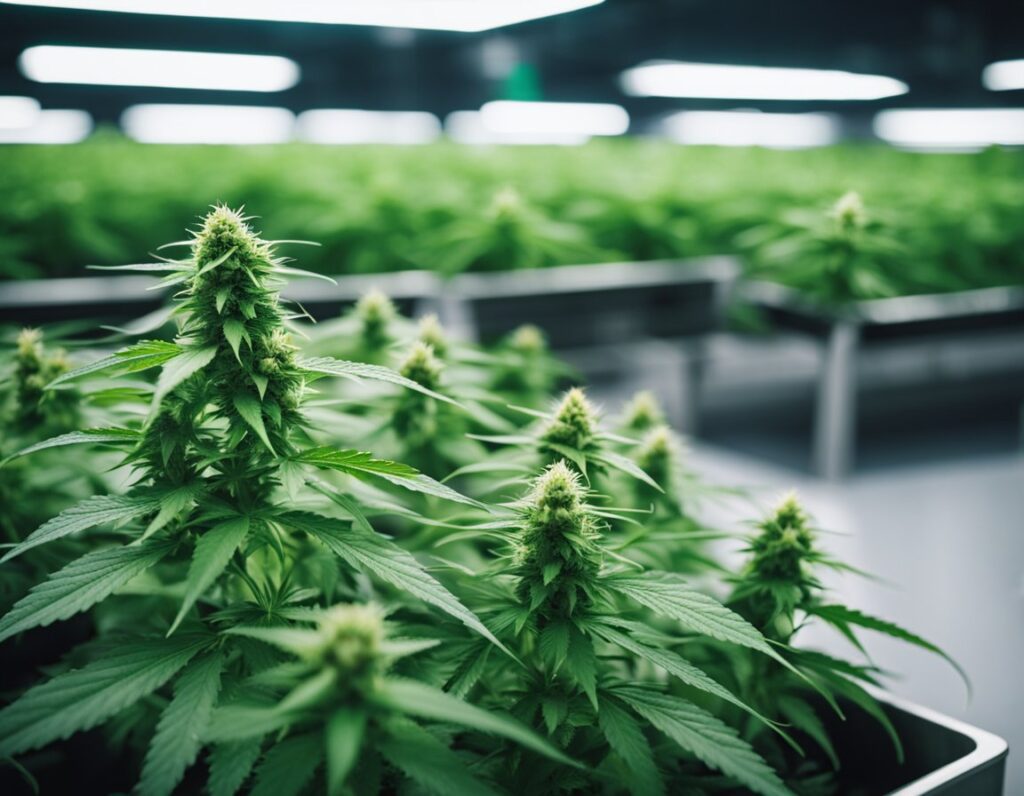
In cannabis cultivation, choosing the right method for propagation can significantly impact your yield and plant quality. You can select between seeding and cloning to ensure the best outcomes for your organic grow.
When selecting organic seeds, look for producers that provide certified organic cannabis seeds. These seeds should be free from pesticides and harmful chemicals. Research the strain’s growth traits, as some may prefer specific conditions.
For clones, choose healthy cuttings from mother plants with vigorous growth and abundant trichomes. High-quality clones will root reliably in organic mediums like coco coir or soil. Ensure that humidity levels remain high during the initial cloning phase, facilitating robust root development.
Utilize a humidity dome to maintain optimal conditions. This practice helps prevent mold and supports healthy growth. Monitor your seeds or clones closely, as environmental factors will affect your yields.
Indica strains often offer dense buds and high yields. They typically require less light and can thrive indoors or in an outdoor setting with moderate conditions. Focus on nutrient-dense soil and organic fertilizers. Regularly check for pests and disease to ensure healthy plants.
Sativa strains may take longer to mature but can yield abundant, lighter buds. These plants prefer warmer temperatures and well-draining soil. Ensure ample light to encourage growth, and use organic nutrients to promote strong development.
It’s crucial to pay attention to the unique needs of each strain, as this will directly influence your overall yield and quality. Both indica and sativa strains can flourish using organic methods, resulting in vibrant flavors and potent effects.
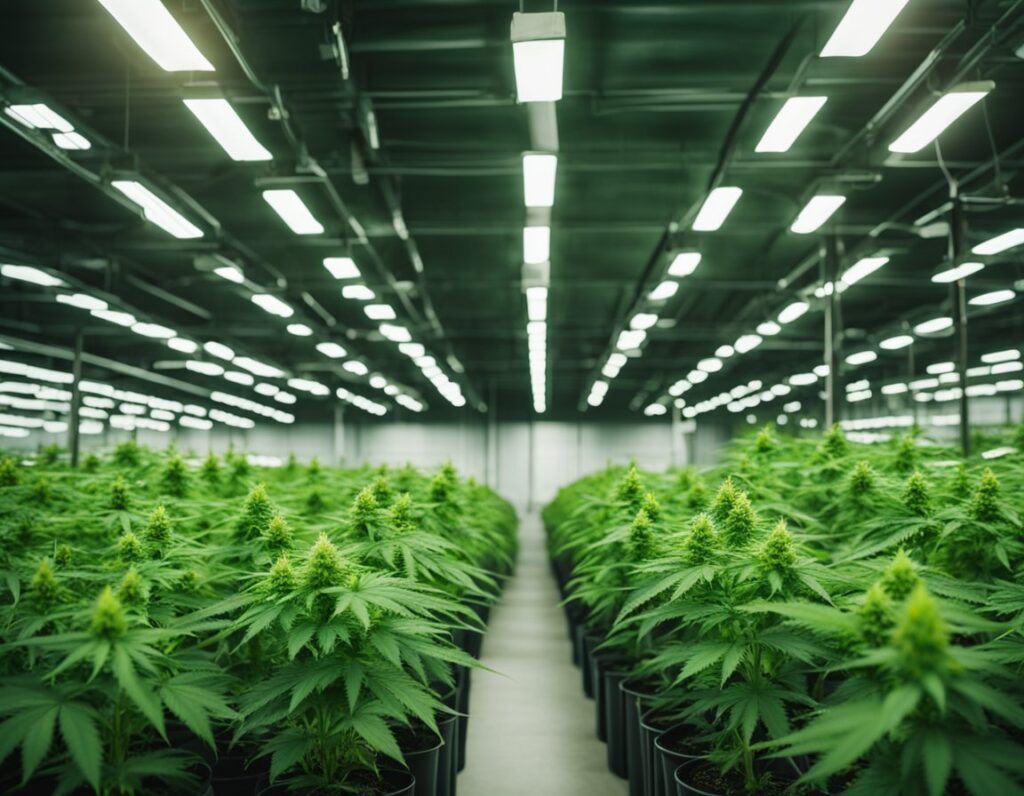
Establishing a successful organic cannabis garden involves critical decisions regarding your growing environment. Your focus should be on the growing medium, air circulation, nutrient management, and the physical layout of your garden.
Selecting the right growing medium is pivotal for healthy cannabis plants. Organic growers often prefer mediums like coco coir, peat moss, and high-quality compost. These options retain moisture while providing excellent drainage.
You can also consider using living soil, which is a blend of organic materials designed to support beneficial microorganisms. This living ecosystem enhances nutrient absorption and improves plant resilience.
Conduct pH tests to ensure your growing medium is within an optimal range of 6.0 to 7.0. Adjustments can be made with amendments such as dolomite lime for raising pH or sulfur for lowering it.
Good air circulation is essential for preventing mold and ensuring even plant growth. Using fans strategically placed within your grow area can help maintain consistent airflow.
Your target temperature should ideally be around 70°F-85°F (20°C-30°C) during the day and slightly cooler at night. You can achieve this by employing climate control systems such as thermostats and exhaust fans.
Humidity control is also important, especially during different growth phases. Aim for 40-60% humidity during the vegetative stage and lower it to about 30-50% during flowering. Use a dehumidifier or humidifier as needed to maintain these levels.
Nutrient management is crucial in organic cannabis cultivation. Regularly monitoring your plants for signs of deficiencies (like yellowing leaves) or surpluses (such as burnt leaf tips) allows for timely adjustments.
Fertilizing with organic nutrients, such as fish emulsions, bone meal, or kelp extract, can provide essential nutrients while promoting soil health. It’s also beneficial to use a soil test kit to identify nutrient content before application.
Adding organic cannabis growing tips for Vancouver into your routine can lead to healthier plants, a more sustainable growing process, and a better yield. Whether you’re using compost teas or raising beds for optimal root growth, these techniques help produce top-quality cannabis that aligns with organic standards, making your growing efforts successful and eco-conscious.
Using raised beds offers numerous advantages for cannabis cultivation. They improve drainage and soil aeration, resulting in healthier roots. When constructing raised beds, ensure they are at least 1-2 feet deep to accommodate root growth.
Consider the orientation of your garden beds for optimal sunlight exposure. Position them to maximize the number of hours they receive direct sunlight, which is critical for robust growth.
Adding barriers around your beds can help deter pests while allowing easy access for maintenance. Utilizing organic mulch can also improve moisture retention and suppress weed growth, further enhancing the health of your plants.
When growing cannabis organically in Vancouver, there are specific methods and practices that can enhance plant quality and yield. Below are answers to common questions about organic cultivation techniques and recommendations tailored for the region.
Organic fertilizers such as fish emulsion, bone meal, and kelp extract are highly recommended for cannabis cultivation. Fish emulsion provides essential nitrogen, while bone meal offers phosphorus and calcium. Kelp extract is rich in micronutrients and hormones that promote healthy plant growth.
Living soil technology enhances the natural ecosystem within the soil, resulting in healthier cannabis plants. This method promotes beneficial microorganisms that improve nutrient uptake and soil structure. As a result, the overall quality, flavor, and potency of the cannabis can be significantly improved.
An optimal soil mix for cannabis includes 40% high-quality compost, 30% peat moss or coconut coir, and 30% perlite or vermiculite for aeration. This combination ensures good drainage, moisture retention, and the availability of essential nutrients for robust cannabis growth.
In British Columbia, organic pesticides such as neem oil, insecticidal soap, and diatomaceous earth are effective for controlling pests. Neem oil disrupts the life cycle of various insects, while insecticidal soap targets soft-bodied pests. Diatomaceous earth acts as a mechanical barrier to prevent pest infestations.
To promote high CBD content, focus on specific strains known for their cannabinoid profile. Use organic fertilizers that contain higher levels of certain nutrients, such as phosphorus and magnesium, during the flowering stage. Additionally, ensure proper light exposure and a stable environment to maximize cannabinoid production.
We ship and deliver world wide via USPS and various couriers.
We offer a wide range of secure and anonymous online payment options.
We care about you, our customer. Please contact us with any questions or concerns.
Find out more about the benefits of being a loyal and regular customer.
WE ARE EVERY GROWERS ONE STOP SHOP TO ACQUIRE PREMIUM CANNABIS SEEDS FOR SALE IN THE USA, CANADA AND AUSTRALIA

Farmers Lab Seeds 2024, | All Right Reserved
Seeds are sold as novelty items, souvenirs, and collectibles. They contain 0% THC. We encourage our customers to check the legislation in their Country, State, Province, and Municipality prior to purchasing items from our store. We do not provide growing information.
All seeds are sold as hemp, and lab tested under 0.3% THC. This product is not for use by or sale to persons under the age of 21. This product should be used only as directed on the label. It should not be used if you are pregnant or nursing. Consult with a physician before use if you have a serious medical condition or use prescription medications. A Doctor’s advice should be sought before using this and any supplemental dietary product. All trademarks and copyrights are property of their respective owners and are not affiliated with nor do they endorse this product.
These statements have not been evaluated by the FDA. This product is not intended to diagnose, treat, cure or prevent any disease. Individual weight loss results will vary. By using this site, you agree to follow the Privacy Policy and all Terms & Conditions printed on this site. Void Where Prohibited by Law.